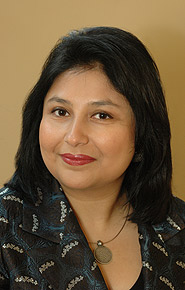Berkeleyan
Strong enrollment demand for Blum Center's inaugural course offering
Ananya Roy's eight-week class on global poverty draws hundreds of students, moves to second new location in PFA Theater
![]()
| 06 September 2006
If its first course offering is any indication, Berkeley's fledgling Richard C. Blum Center for Developing Economies is off to a flying start. After two location changes necessitated by strong student demand, the eight-week, two-unit class - titled "Global Poverty: Challenges and Hopes in the New Millennium" - will now be held in the Pacific Film Archive Theater, the better to accommodate its more than 200 undergraduate and grad-student enrollees. Another 80 students have been waitlisted, and two dozen others have asked to audit.
 Ananya Roy (Peg Skorpinski photo) |
The class, set to begin Sept. 11, will be led by Ananya Roy, an associate professor of city and regional planning and recipient of the campus's 2006 Distinguished Teaching Award. Roy, author of City Requiem, Calcutta: Gender and the Politics of Poverty, is an associate dean in International and Area Studies (IAS) and has served as acting faculty director for the Berkeley Programs for Study Abroad. She also represented IAS in early meetings between the campus and Berkeley alum Richard Blum, the San Francisco-based financier, philanthropist, and UC regent whose $15 million gift launched the multidisciplinary initiative in April.
Roy views the center's inaugural course as a first step in an effort to build on work already being done by Berkeley faculty in various schools and departments, and to integrate theory and practice.
"The faculty is doing research and teaching in this area, but Dick Blum was also interested in making sure that students can actually go out and work in different parts of the world," Roy explains. "That's not an easy thing to accomplish, and yet it's an important goal for the campus in many ways."
Roy's aim - both with this course and others to be developed - is to "reach out to students in a variety of disciplines and professions, and help them gain a deep understanding of what it means to work on global issues, particularly those around poverty and inequality."
She has already reached out to colleagues from various disciplines, many of whom will participate in class sessions to be based on themes such as technology, labor, and human rights. Berkeley faculty scheduled to appear as guest lecturers and panelists include Eva Harris (public health), Kara Nelson (civil and environmental engineering), Eric Brewer (computer sciences), Raka Ray (sociology), Eric Stover (Human Rights Center), Dara O'Rourke (ESPM), and Ted Miguel (economics).
Despite the larger-than-expected class size, Roy promises the two-and-a-half-hour sessions will allow for plenty of discussion along with the lectures. And she more than shares her students' enthusiasm - she canceled a planned leave for the fall semester in order to teach the course.
"We're all passionate about these issues," she says of her faculty colleagues, "but we haven't necessarily collaborated across these fields." She adds that "the student response to this class indicates that there's great interest in these issues," and that the hoped-for creation of a minor in global poverty under the auspices of the Blum Center "could serve students in a whole range of disciplines and professions."
"I think the project work and the research work is important," Roy says. "But I continue to think of us as a public university with a certain mandate for undergraduate education..I'm delighted we can do something that is not only cutting-edge, but that also speaks to the fundamental mission of the Berkeley campus."
For more information on the Blum Center, visit its website at blumcenter.berkeley.edu.

